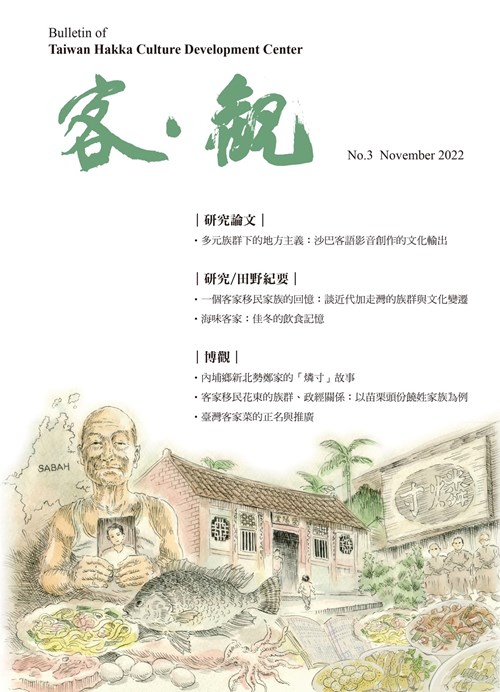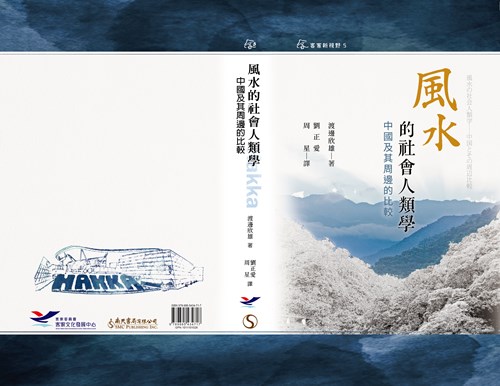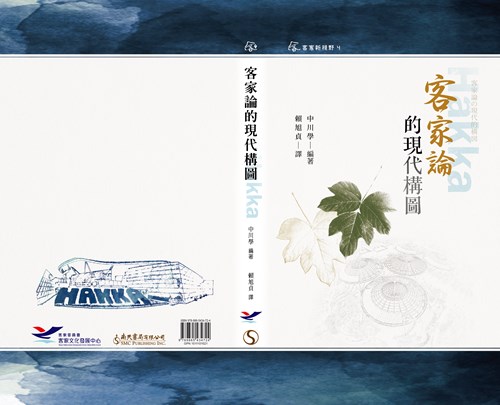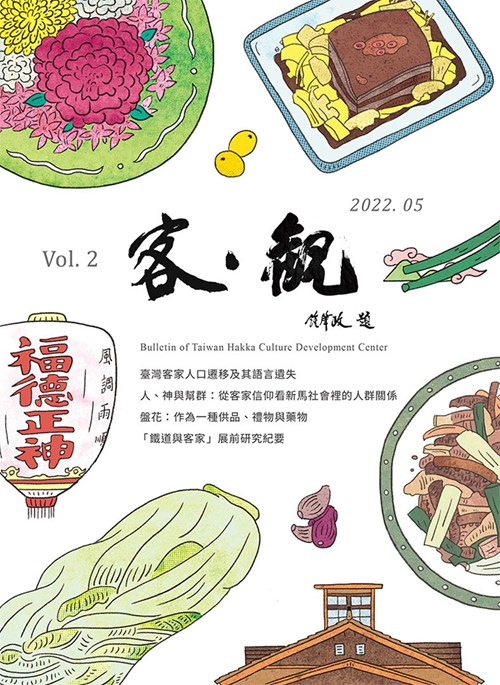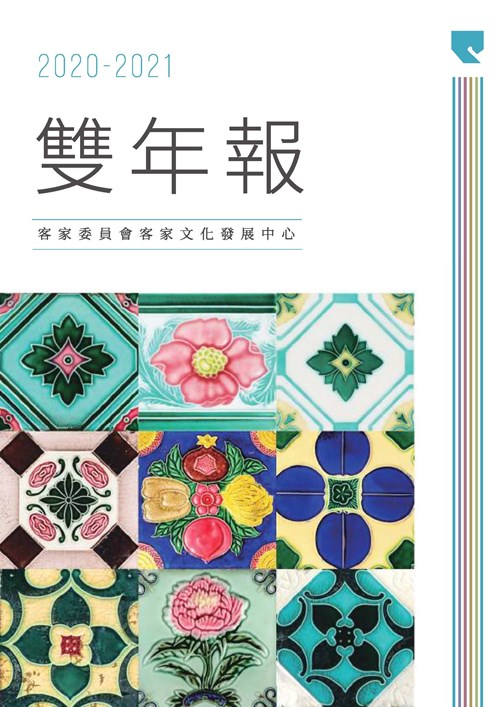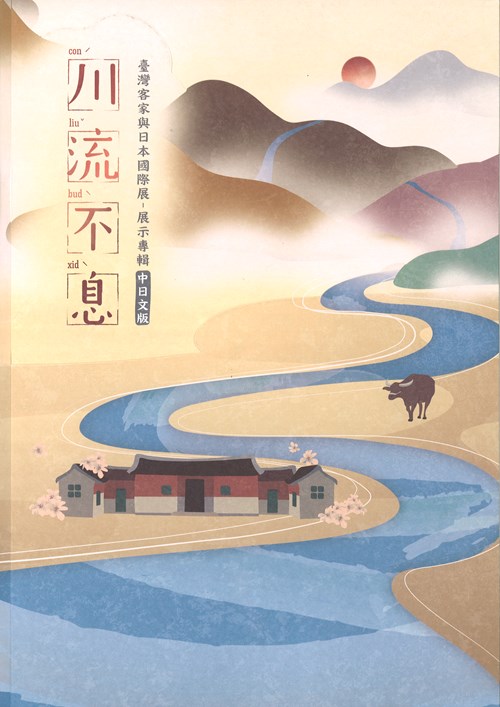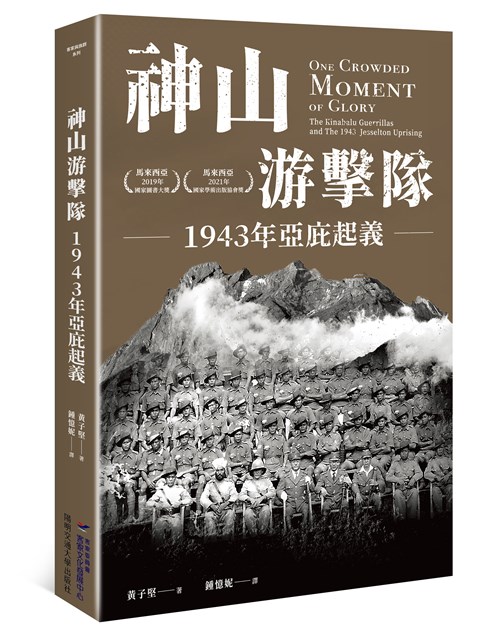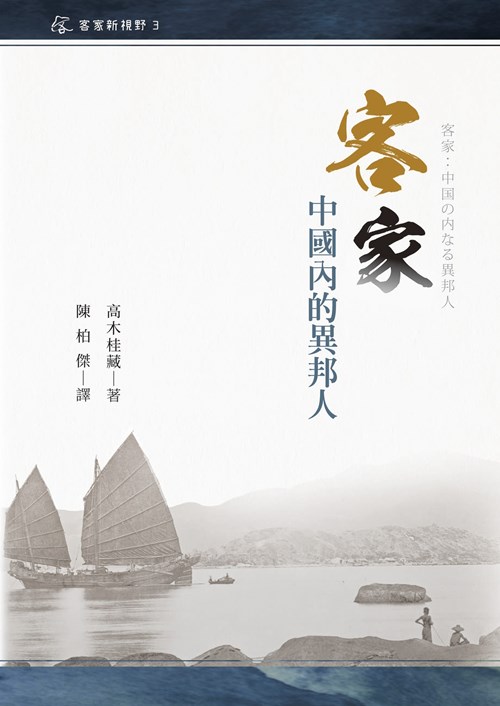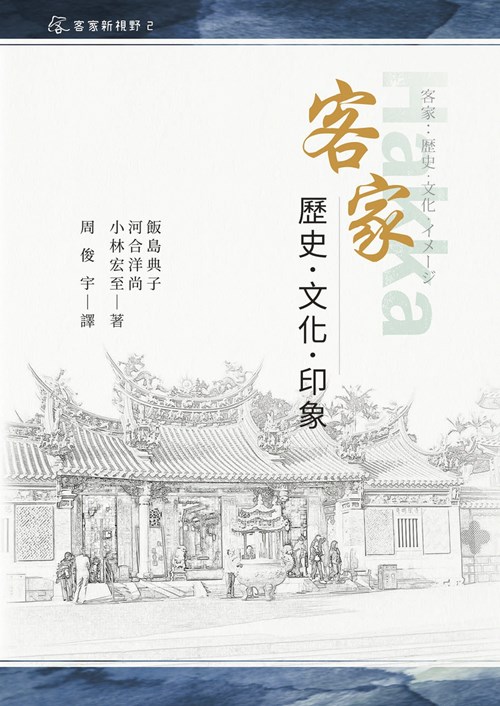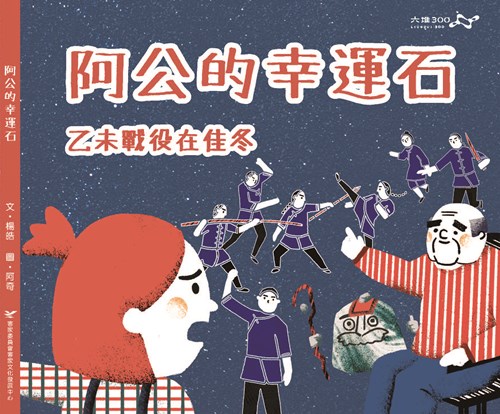
Research & Library
Publications

-
![]()
The Bulletin of Taiwan Hakka Culture Development Center (Issue No. 3)
Publication Date:Chief Editor: Lin Pen-hsuanPublication Date: January 2023|Research Articles|• The Localism under a Multi-ethnic Society: The Cultural Output of Sabah Hakka Online ContentBy Bernard Ng Jia Han|Research / Field Reports|• A Hakka Immigrant Family’s Memory: Ethnic and Cultural Transformations in Modern KakacawanBy Lin Jiann-Cherng• The Ocean Taste of Hakka: Food Memories of JiadongBy Tsai Shin-Er|Hakka Forum|• The “Matchstick” Story of the Cheng Family in Xinbeishi, Neipu TownshipBy Cheng Chun-chun & Hung Yi-chen • Ethnic and Political-Economic Relations of Hakka Migration to Eastern Taiwan: A Case Study of the Yao Family from Toufen, MiaoliBy Ho Lai-mei • Naming and Promoting Taiwanese Hakka CuisineBy Chang Jung-chia
-
![]()
The Social Anthropology of Fengshui
Publication Date:Author: Watanabe YoshioTranslators: Liu Zheng-ai and Zhou XingPublication Date: First Edition, August 2022Fengshui (風水) holds a central place in Hakka culture, making its study an important path to understanding Hakka society. Professor Watanabe Yoshio began his fieldwork in Taiwan in 1978, conducting long-term ethnographic research in the Liugdui Hakka region of Pingtung. Beyond Taiwan, he has carried out extensive anthropological investigations across East Asia, including Japan, Okinawa, and mainland China.Drawing upon decades of field experience and research, Watanabe published The Social Anthropology of Fengshui: Comparative Studies of China and Its Surrounding Regions in 2001. The book sought to address the widespread misunderstandings surrounding Fengshui that arose during the surge of popular interest in the subject, presenting a rigorous anthropological interpretation of its social and cultural dimensions.This translated edition systematically explores the definition, historical study, and theoretical framework of Fengshui, while introducing rich ethnographic materials collected by the author—ranging from statistical data on Fengshui beliefs to detailed case studies based on interviews and site observations. Through these vivid local accounts, the book reveals the cultural logic and lived practices of Fengshui in everyday life.As one of the most significant anthropological works on the subject, The Social Anthropology of Fengshui provides not only textual analysis but also a record of field exploration, offering readers in the Chinese-speaking world a deeper academic understanding of Fengshui and its place in East Asian cultural history.
-
![]()
The Modern Composition of Hakka Studies
Publication Date:Authors: Nakagawa Manabu, Tai Kuo-hui, Hashimoto Mantaro, Lin Geng, and Sakamoto HirokoTranslator: Lai Hsu-chenPublication Date: First Edition, August 2022The “Theory of Central Plains Origin,” advanced by scholars such as Lo Hsiang-lin, has long been a dominant perspective in Hakka studies and a key component of many Hakka people’s sense of ethnic identity. However, Japanese scholar Nakagawa Manabu, through extensive textual analysis and critical inquiry, reexamines this prevailing understanding of Hakka identity. He introduces two analytical concepts—“reality” (真實) and “fact” (事實)—to articulate a more nuanced view.According to Nakagawa, “reality” refers to the realm of psychological and subjective consciousness, while “fact” denotes verifiable reality established through systematic academic inquiry. Based on this foundation, the book investigates the relationship and tension between “reality” and “fact” in the Hakka spirit, exploring how collective identity is formed, justified, and reconstructed.Centered on Nakagawa’s essay “The Political and Economic Historical Image of the Hakka Chinese,” this volume examines themes such as Hakka political economy, ancestral origins, the Chongzhen (崇正) spirit, and social-economic organization, tracing the interplay between factual analysis and lived experience to construct a modern intellectual framework for Hakka studies.In addition to Nakagawa’s work, this collection includes essays by Tai Kuo-hui, Hashimoto Mantaro, Lin Geng, and Sakamoto Hiroko, whose diverse perspectives opened new horizons in Hakka scholarship. Together, these writings not only compile foundational studies in the field but also showcase the intellectual dialogue and cross-cultural interpretations that continue to shape contemporary understandings of Hakka identity.
-
![]()
The Bulletin of Taiwan Hakka Culture Development Center (Issue No. 2)
Publication Date:Chief Editor: Lai Yu-chingPublication Date: May 2022 |Research Articles|• Hakka Population Migration and Language Loss in Taiwan• Humans, Deities, and Associations: Social Relations in Hakka Religious Practices in Singapore and Malaysia |Research / Field Reports|• Plate-flowers Offering: Offerings, Gifts, and Medicinal Objects• Pre-Exhibition Study Notes on “Railways and the Hakka” |Reviews|• Review of The Hakka Cookbook: Chinese Soul Food from around the World, written by Lau Anusasananan, Linda. 2012. University of California Press. |Hakka Forum|• Reflections on Hakka Cuisine• Similarities and Differences in Hakka Foodways across the Taiwan Strait• The Yi-Min Shrine in Jiaxian: A Unique Site of Interethnic Harmony and Hakka Identity• “Traveling through Hakka Villages”: Bagˋ Gungˊ’s (the Earth God’s) Reunion
-
![]()
The Biennial Report of Hakka Cultural Development Center, 2020–2021
Publication Date:Chief Editor: Lai Yu-chingPublication Date: First Edition, May 2022The Biennial Report 2020–2021 compiles an overview of the Hakka Cultural Development Center’s key undertakings across its northern and southern cultural parks, including activities in research and publication, cultural heritage preservation, exhibitions and performing arts, educational outreach, and public services.In celebration with the Center’s 10th anniversary, the report also features special articles reviewing the development and achievements of both parks over the past decade. These include a chronology of major milestones, as well as summaries of field investigations, collections, exhibitions, and publications, providing readers with a comprehensive record of the Center’s decade-long dedication to preserving and promoting Hakka culture.
-
![]()
A Never-Ending Stream: The Taiwanese Hakka and Japan International Exhibition Catalogue
Publication Date:Chief Editors: Lai Yu-ching and Hung Deng-chinAuthors: Ho Chin-liang, Kawai Hironao, Hung Deng-chin, Hsu Fang-chih, Chang Wei-an, Lai Yu-ching, and Lai Po-jo (listed in order by Chinese surname)Publication Date: May 2022A Never-Ending Stream: The Taiwanese Hakka and Japan International Exhibition represents one of the key outcomes of a six-year academic cooperation agreement signed among the Hakka Cultural Development Center, Hakka Affairs Council; the National Museum of Ethnology, Japan; and the College of Hakka Studies, National Yang Ming Chiao Tung University. The exhibition’s premiere was held in August 2020 at the Taiwan Hakka Museum of the Hakka Cultural Development Center.The exhibition is organized around three major themes:1. Records of Hakka Life during the Japanese Colonial Period – featuring materials such as Hakka language textbooks from the Japanese era, the Hakka people’s contributions to local industries and community life, scenes of everyday life in Hakka villages, the development of baseball in Hakka communities, and notable Hakka writers and musicians of the time.2. Hakka People Living in Japan – introducing distinguished Hakka individuals who have worked diligently and achieved success in Japan, the development and activities of Hakka associations there, and the cultural connections between Japan and the Hakka through the Xu Fu (徐福) belief tradition.3. Japanese Scholars and Hakka Studies in Taiwan – highlighting recent collaborative research and exchanges between Taiwanese and Japanese scholars in the field of Hakka studies.This catalogue compiles the complete content of the exhibition, presenting the interwoven histories and ongoing cultural exchanges between the Hakka of Taiwan and Japan—a relationship that continues to flow, like a river without end.
-
![]()
One Crowded Moment of Glory: The Kinabalu Guerrillas and the 1943 Jesselton Uprising
Publication Date:Malaysia 2019 National Book AwardMalaysia 2021 National Academic Publishing Association Award Who were they fighting for? And why? On October 9, 1943, a Saturday evening, the Kinabalu Guerillas sallied forth. The plan was a surprise attack on Tuaran police station to liberate that town from the hands of the Japanese. There followed a night attack on Jesselton (Kota Kinabalu). October 12, 1943. With countless dead and injured from the guerrilla raid, the humiliated and furious Japanese swore to take full revenge. It is reported that on the way to Inanam the Japanese shot at anything that moved. In World War II, a group of young ethnic Chinese in Malaysia (primarily Hakka) organized themselves into the “Kinabalu Guerrillas,” banding together with local islanders to resist the tyrannical Japanese military occupation. On an early Autumn evening their successful surprise attack temporarily liberated Jesselton. But they also drew a swift and brutal reprisal from the Japanese army that included the imprisonment and indiscriminate killing of locals and the massacre at Petagas. After peace returned to Sabah, the colonial government in Petagas erected a war memorial and Sabah locals have long remembered the brave deeds of the Kinabalu Guerrillas, who embodied the spirit of their pursuit of freedom and of heroic struggle against a far more powerful enemy. Publishers: National Yang Ming Chiao Tung University Press, Hakka Affairs Council Taiwan Hakka Culture Development CenterAuthor: Danny Wong Tze Ken (Director, Faculty of Arts and Social Sciences, University of Malaya)Chinese Translation: Chung Yi-niISBN: 978-9865434465Published: November 2021
-
![]()
The Hakka: Foreigners Within China
Publication Date:The book focuses on the portrayal of important Hakka historical figures, displayingthe outstanding qualities of Hakka people. Author Keizo Takaki opens with their experiences with the Hakka before taking the reader back into history, telling how Hakka people such as Zhu Yigui, Hong Xiuquan, Sun Yat-sen and Deng Xiaoping have influenced the development of modern history. The book further traces the paths of Hakka migration, describing how Luo Fangbo, Lee Kuan Yew and Hakkas all over the world have step by step expanded the regions where they live and put down roots to blend into societies everywhere. This work shows that Hakka possess strong solidarity, are hardy and industrious, and are fully confident in their culture and traditions. Author: Keizo TakakiChinese Translation: Chen Po-chiehReviewed by: Chang Wei-an, Huang Yi-chun Publisher: Ho Chin-liangAdmin Adviser: Wu Te-chiPlanning and Execution: Lai Yu-ching, Hsu Kuo-feng Publisher (1): Hakka Affairs Council Taiwan Hakka Culture Development Center, Tongke South Road No. 6, Jiuhu Village, Tongluo Township, Miaoli County 36645 Publisher (2): SMC Publishing Inc., No. 14, Alley 14, Roosevelt Road Section 3 Lane 283, Taipei City 106019 Design Editors: Chen Wen-hsin, Huang Ying-fuText Correction: Lin Wei-minISBN: 978-986-5434-31-1VAT no.: GPN 1011000753Edition: September 2021, 1st printingPrice: NT$350Japan Kodansha Ltd. has authorized SMC Publishing Inc. to publish this traditional Chinese character edition. It may not be reprinted, copied or reproduced by any means, in whole or in part, without the agreement of Kodansha Ltd.
-
![]()
The Hakka: History, Culture, Impressions
Publication Date:This book, based on field surveys and documentary research of Hakka districts, examines the three aspects of “history and geography,” “life and customs” and “representation and identification” to introduce the history, culture and image of the Hakka. The authors have carried out case studies in East Asia over many years and extend outwards from this center. Through field surveys carried out over many years, the authors got alongside and lived with contemporary Hakka people and have turned their personal experiences into relatable words that allow the reader to also feel present and experience Hakka customs from all over. Authors: Noriko Iijima, Hironao Kawai, Hiroshi KobayashiChinese Translation: Chou Chun-yuReviewers: Chang Wei-an, Huang Yi-chun Publisher: Ho Chin-liangAdmin Adviser: Wu Te-chiPlanning and Execution: Lai Yu-ching, Hsu Kuo-feng Publisher (1): Hakka Affairs Council Taiwan Hakka Culture Development Center, Tongke South Road No. 6, Jiuhu Village, Tongluo Township, Miaoli County 36645 Publisher (2): SMC Publishing Inc., No. 14, Alley 14, Roosevelt Road Section 3 Lane 283, Taipei City 106019 Design Editors: Chen Wen-hsin, Huang Ying-fuText Correction: Lin Wei-minISBN: 978-986-5434-32-8Edition: September 2021, 1st printingPrice: NT$500Translation and publication authorized by Gendai Shokan, Japan
-
![]()
Grandpa’s Lucky Stone: The 1895 Yiwei War in Jiadong
Publication Date:Editor/Author: Hakka Cultural Development Center, Hakka Affairs CouncilPublication Date: December 2021Grandpa’s Lucky Stone takes place during the Battle of Qiedongjiao (茄苳腳) in Left Dui, one of the key engagements fought by Liugdui during the Yiwei War of 1895. Through the eyes of Amei, a young girl, and her mysterious lucky stone, the story transcends time and space, transporting readers back to the battlegrounds of old Jiadong(佳冬), where Hakka villagers stood shoulder to shoulder in defense of their homeland.Beyond capturing the tense atmosphere of war, the story conveys the solidarity and courage of the Hakka people—men, women, and children alike—who fought together to protect their community. The book’s extended reading section also provides historical background on the Yiwei War and the Battle of Qiedongjiao, helping readers gain deeper insight into this significant episode in modern Taiwanese and Hakka history.
